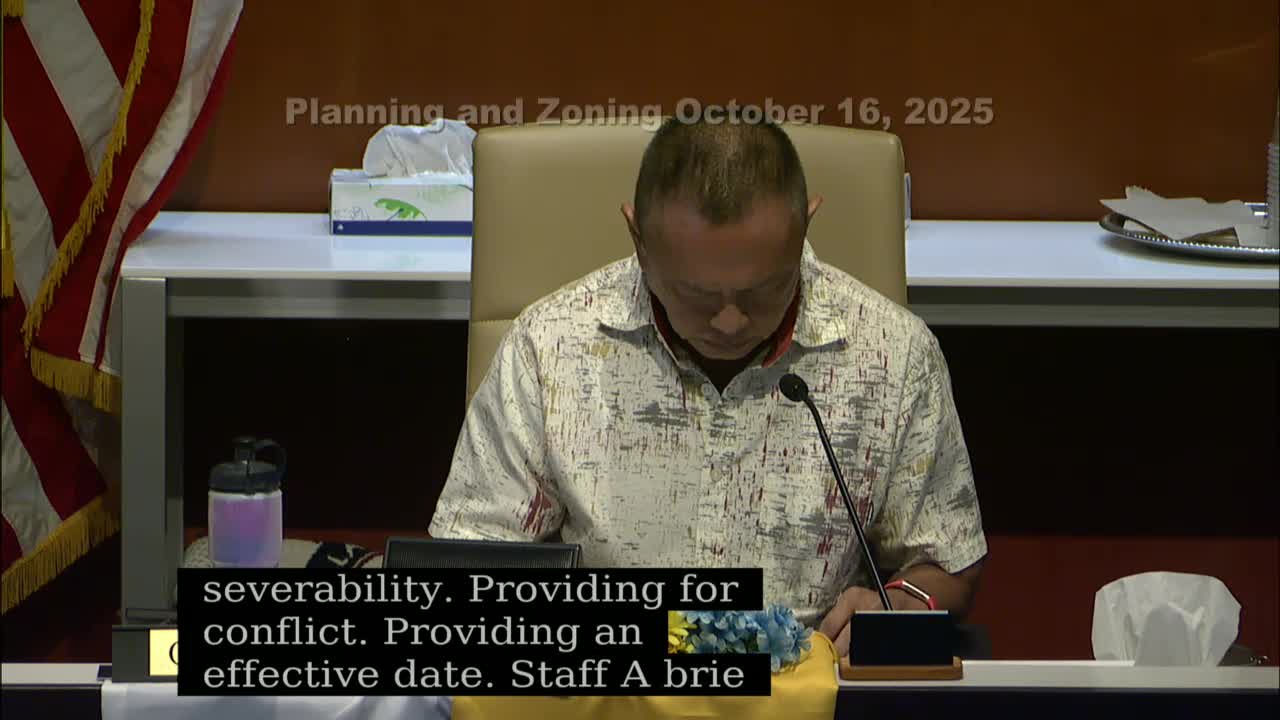Board recommends ordinance to create citywide waivers for non‑dimensional zoning rules
Get AI-powered insights, summaries, and transcripts
Subscribe
Summary
The Hallandale Beach Planning and Zoning Board on Oct. 16 voted unanimously to recommend an ordinance that would create a citywide waiver process allowing the director, the board or the City Commission to relax non‑dimensional zoning requirements under defined criteria, with fee, notice and expiration provisions.
The Hallandale Beach Planning and Zoning Board voted unanimously Oct. 16 to recommend an ordinance that would add a new waiver process to the city’s zoning code, allowing relief from non‑dimensional regulatory requirements such as building materials and parking when certain criteria are met.
Planning staff presented the proposal as a citywide option that supplements existing variance and redevelopment area modification (RAM) processes. Christie Dominguez of the Planning and Zoning Division said the ordinance would define “waivers,” set three review levels (administrative, board and commission), allow conditions and set expirations, and permit fee reductions in some cases.
Dominguez told the board the draft ordinance creates three categories of review: administrative waivers for single‑family and other minor developments that do not require board or commission approval, waivers that the Planning and Zoning Board could grant for certain minor developments, and waivers that would be decided by the City Commission for major developments that already require commission action. “So the first thing is we would provide a definition of waivers to relax the non dimensional requirements that would apply citywide,” Dominguez said.
The draft also includes approval criteria, authority to impose conditions, a sunset or expiration on granted waivers (board members discussed a six‑month standard for related variances), and a provision letting the city manager reduce fees up to 100 percent when an application arises from an error or omission by the city. Staff said after‑the‑fact permit penalties would be twice the applicable fee and that notice requirements for waivers were amended in the draft.
Board members asked for clarifications and for specific language changes during debate. Vice Chair Garrison asked whether the manager’s fee reduction would be staggered or able to be fully waived; staff gave a concrete example in which a permit issued without a zoning review later required relief for a setback encroachment, and said the applicant could petition the manager for a fee waiver in those circumstances. Members also discussed adding explicit language that an approved waiver should not establish precedent and asked staff to clarify where the draft uses “10 days” versus “10 working days.” Dominguez agreed to correct typographical errors and add clarifications requested by the board.
The discussion also touched on how the new waiver process relates to redevelopment area modifications (RAM). Dominguez said RAMs remain available where authorized and cannot be removed from the code until June 2028 because of state statute (identified in the discussion as Senate Bill 180); the waiver process would operate citywide as an additional option.
After questions and suggested edits, a board member moved to approve the ordinance with the modifications requested by the chair; another member seconded. The motion passed unanimously, with the board recommending the ordinance as amended to the City Commission for final action.
The board recorded several technical directions to staff: correct bracketed language and typos in the draft, clarify references to calendar versus working days, add language limiting waiver precedence if the board chooses, and confirm the proposed expiration language. Staff also agreed to return corrected language and to coordinate with the city attorney on any legal clarifications the board requested.
Votes at a glance: motion to recommend approval as amended — approved unanimously. The ordinance will proceed to the Mayor and City Commission for consideration.
